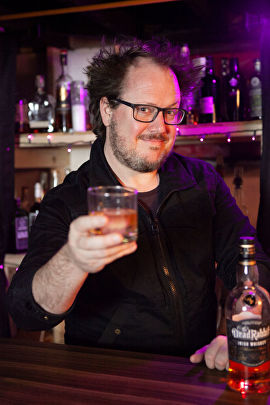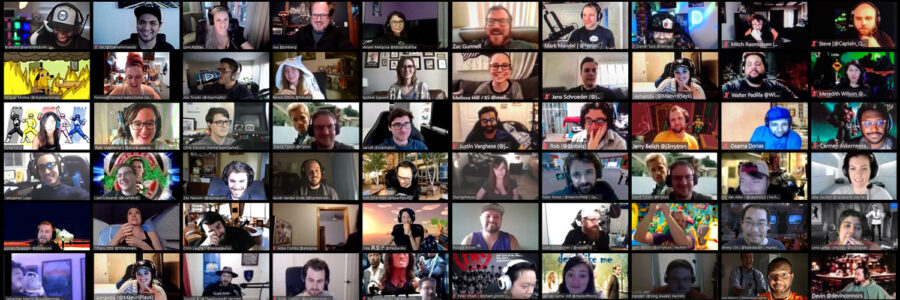The pandemic has changed the games industry in many ways over the past year, most notably in the field of events — i.e. there aren’t any. Even the imminent E3, the biggest games show of the year, has been relegated to a series of online broadcasts, rather than taking over the centre of Los Angeles for an entire week.
While conference talks and panel sessions can be delivered via video, other aspects of games industry life have been harder to replicate — those face-to-face meetings with the investor or publisher you hope will back your game, or the in-person conversation that might lead to a job offer. But there’s one other element of industry conferences that has been difficult to recreate online: socialising.
Last year, Guy Blomberg, then of GamesIndustry.biz parent ReedPop, recognised the issue. As he returned from PAX East, news emerged that GDC 2024 had been cancelled and a string of other cancellations followed in the next few weeks. It created what he describes as an “apocalyptic feel” — especially for someone who enjoyed socialising with other people in the industry.

Guy Blomberg, Games Industry Gathering
“The idea of not being able to do that for an indeterminate period of time scared me a great deal,” he says. “Everyone was looking into other ways to connect, thinking about how to do panels and all that kind of stuff. Whereas I was thinking about how we could get together on video calls in a way that doesn’t overwhelm or in a way that you can connect with people that you don’t actually know. So I just started up a Zoom call with a couple of friends.”
That Zoom call quickly evolved into what is now known as Games Industry Gathering. Industry professionals cram into one call every Friday, but are split into breakout rooms of up to six people for 20 minutes, enabling a more manageable and comfortable conversation. After the time is up, everyone is pulled back into the lobby, new groups are randomly generated and then it’s back to the breakout room, this time with new people to connect with. The call often goes on for up to 12 hours, allowing people from multiple timezones to take part.
Originally known as Games Industry Hotel Bar, the aim was to recreate the atmosphere you might expect at a nearby hotel bar after a long day. But Blomberg soon gathered from early feedback that this might deter non-drinkers, and the name was changed to Gathering — affectionately known to its community as the GIG.
Far from a fleeting experiment, the GIG has now been running for more than a year now, with around 3,200 registered members. It has attracted participants from around the world, and boasts a more diverse audience than many real-world industry events. Blomberg estimates that at least 40% of members are women or non-binary, and that number has been maintained, or increased, since the GIG first began.
This is no accident, of course. The Gathering is diverse by design; calls are invite-only affairs, and while any member of the industry may request an invite, there is careful curation to ensure that those from minority communities don’t become minorities in the GIG.
“It’s actually very simple to make a safe space. If someone feels uncomfortable or harassed, you remove the person that is making them feel uncomfortable”
Guy Blomberg, GIG
“Early on, there was talk about how this could be a better representation of the games industry than what we’re used to — which is a bar full of white dudes,” Blomberg explains. “The only way to do that is to have a waiting list of — there’s no easy way of saying it — a whole bunch of white dudes, in order to keep up that level of diversity and representation. That’s been actively curated to keep it that way, and that’s been under the guidance and direction of the other groups we work with and the people behind them.”
These groups include advocacy organisations such as POC in Play, LatinX in Gaming, the IGDA Foundation and the team behind the Games Harassment Hotline. In consulting these folks, and inviting them to take part, Blomberg also found people who would go on to help him host and moderate each weekly session — including IGDA Foundation’s Nika Nour and LatinX in Gaming’s Cristina Amaya.
“I’m an extreme extrovert, so the ability to meet new people and connect, and also to help facilitate that, is great,” says Nour. “When Guy asked me to host, it was an opportunity for me to pay it forward because he was putting in so much effort every Friday to make sure everybody felt welcome.
“Being in the GIG felt like my after-five happy hour. It’s not really part of any of my jobs, it was more of a personal space for me than an organisational one. That was the beauty of what Guy did in bringing people together.”
For Amaya, it’s the sense of community that encouraged her to get involved, reminding her of past online hangouts: “Back when I was into World of Warcraft, I could have gone outside but the game was a place for me to meet up with people, I could hang out with my friends in Orgrimmar. A lot of us are gamers first and foremost and we’re kinda used to that sort of connection space, so having it again almost felt nostalgic.

Cristina Amaya, Games Industry Gathering
“It’s a social moment and it’s a networking event. And a lot of people are dependent on these events to network, to find opportunities, to build their careers, and they didn’t have that. Here, I remember one call where I was able to connect somebody to get hired for a role. It happens, it’s possible, and the GIG helps build that space.”
Back in April, the Gathering celebrated its first anniversary — quite the accomplishment when, anecdotally, there are plenty of people out there who gave up on weekly video calls to their own families out of lockdown fatigue. So why are industry professionals hopping online to speak to a virtual room full of strangers every week?
“Well, the good thing about the GIG is it doesn’t require anyone to attend every week,” says Blomberg. “It’s very much the bar that’s there every week and you can drop in or drop out, you can turn up every week or once every six months. It’s been very non-committal and very inoffensively available to folks and I think that has made it a lot more appealing. There’s no pressure.”
“Having a regular, consistent thing helps, too. It’s not even something you have to add to your calendar. You just know that on Friday, if you want to, the option’s there to pop in. And after you’ve done it once, the mystery fades and it doesn’t seem so scary or confronting.
“There’s no tolerance for harassment or toxicity, there’s a real sense of safety and camaraderie and that is very rare in the games industry”
Nika Nour, IGDA Foundation
“Honestly, the hardest part is convincing people to join a Zoom call filled with people they’ve never met before. That sounds really scary, but once you get past that and you realise these are the same random people you’d meet at conventions, it becomes quite comfortable.”
Nour, however, didn’t believe the GIG had long-term potential at first.
“I totally thought this was going to fizzle out, so I’m shocked,” she laughs. “I really think the reason it hasn’t is because there’s just really good moderation at play. There’s no tolerance for harassment or toxicity, there’s a real sense of safety and camaraderie and that is very rare in the games industry. We talk about safety and online harassment all the time, we see it as pervasive, and GIG has done a very good job of not just stating stuff up front but also living by its values. The values that were established early on are what’s drawn a good quality of people, not just quantity.”
Herein lies another key to GIG’s appeal: its rules are very simple but allow for a very inclusive space. These rules are included with each weekly invite email, or available on the Gathering’s Discord server, and are presented as four pillars: Games industry only. No recording. You don’t have to drink. Don’t be a jerk.
That last one, in particular, is something of a priority for the mods and makes it much easier to create a space when everyone can feel like part of the conversation. It’s something Amaya is keen to deal with, drawing on her past experience as a bartender that means her “tolerance for drunken shenanigans is low.”
“I think we are one of the safest spaces in gaming,” she says. “We try so hard to make people feel safe, like they are able to talk — and that’s why people keep returning. Some of these personalities are big and loud, but we’re not here to tamper that. We’re just here to make people feel safe and welcome.
“Something that happens at a lot of games industry parties is people don’t feel safe. If they’re at a loud party or some huge gathering, they don’t know where to turn. The whole thing about GIG is you know who to talk to, and you know the people moderating have your back.”

Games Industry Gathering meets every Friday, but participants aren’t required to take part every week
Nour agrees, reiterating that tackling toxicity is never the same as stifling the more outgoing personalities. While certain people may dominate proceedings in the real world, the smaller groups afforded by the breakout rooms help everyone have a voice.
“It’s not about keeping people in check,” says Nour. “It’s about allowing them to be who they are… Leadership is giving other people a chance to be part of the dialogue. Granted, I host the late night crew so sometimes leadership’s got some slurred words.”

Nika Nour, IGDA Foundation
Blomberg adds: “Every host has their own style, but the consistency is if someone feels unsafe, we act. Immediately. It’s actually very simple to make a safe space — if someone feels uncomfortable or harassed, you remove the person that is making them feel uncomfortable. You can deal with everything else later, but if you do that immediately… it’s very simple.”
The trio reports that, while there have been incidents in the past year, there have been very few and each has been swiftly dealt with. Another rule is that if you are booted from the GIG one week, you do not receive another invite.
“I haven’t seen a single person return that people are really uncomfortable with,” says Amaya. “Unfortunately at gaming events, you will regularly see people who others are uncomfortable with, people who have been MeToo’d, all sorts of stuff. That doesn’t happen at GIG.”
Games Industry Gathering emerged from the need to sustain and forge social connections at a time when the coronavirus pandemic prevented people from doing so. With vaccines rolling out and real-world events on the horizon, the hosts hope the GIG has shown how any gathering, on or offline, can be more inclusive.
“I’d love to see real events where there are no creepy people,” says Nour. “For women, for underrepresented communities, there’s a sad truth that there are some people in the industry who don’t realise gendered or racist advances are not okay. We still have an equity problem, and the GIG is a very equitable place.
“I think we are one of the safest spaces in gaming. We try so hard to make people feel safe, like they are able to talk – that’s why people keep returning”
Cristina Amaya, LatinX in Gaming
“I can show up, have a business conversation or riff off of an idea, and no one’s going to ask me for my number or a drink or just have weird, hidden agendas after. At games conferences, it’s just not like that — and that’s why you have such high burnout rates among underrepresented communities trying to get into games. It is exhausting.”
Blomberg adds: “The community that has been built here, and the ability to connect with people from different countries, is something I want to keep in some way, shape or form. Maybe it’s just the Discord, maybe the Zoom call moves to Wednesday if everyone’s out on Friday’s nights.
“And there’s definitely a place for physical social events, probably around games industry conferences, that are GIG-led social events, with the same curation of attendees for representation and the same policies of ‘You’re making someone uncomfortable, so you’re out. And not just out of this party, but out of the GIG.’ I’ve not seen that level of accountability anywhere in conventions before, and I think that will be something truly unique — and, frankly, kinda needed.”
And, naturally, the original GIG will continue online. Back in October, the hosts were growing tired after six months of weekly gatherings and announced plans to scale things back, perhaps running it as a monthly affair. But an outpouring of appreciative members, people who said they had come to rely on the Gathering during lockdown, encouraged them to continue.
“I think it will go on [after the pandemic],” Blomberg concludes, “but I preface that by saying there’s no ultimate agenda, three-year plan or grand strategy. This has been kinda winging it from month to month.”
GamesIndustry.biz has partnered with Games Industry Gathering to run a special E3 edition, ‘The JW’, on Tuesday, June 15. You can sign up for free here.
GamesIndustry.biz
Source link
Related Post:
- Back 4 Blood beta became one of Steam's most actively played games in just a few hours
- Random: The Internet Is Dunking On Space Jam 2's Game Boy Cameo
- The Hidden Story of Lady Dimitrescu - Her Origins, How She Became A Vampire And More
- How Assassin's Creed creator Patrice Déselets became gaming's cool history teacher
- In Just Five Days, Mario Golf: Super Rush Became The Second Best-Selling Game In The Series
- Magic: The Gathering TV series stars Brandon Routh as Gideon Jura
- SDCC: Magic: The Gathering’s Mark Rosewater on the first ever D&D cards
- Magic: The Gathering’s Lord of the Rings crossover is going to be huge
- Magic: The Gathering's Universes Beyond Expands Into The Upside Down With A Stranger Things Secret Lair
- Innistrad: Midnight Hunt Brings Night And Day Changes To Magic: The Gathering
